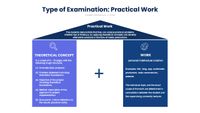Type of Examination: Practical Work.
By Prof. Dr. Alfred-Joachim Hermanni
(The so-called “practical work” by Hermanni was included in the study and examination regulations of the SRH Fernhochschule - The Mobile University on May 31, 2016. In addition, the German Society for Journalism and Communication Studies, Media Economics Section, recommends the practical work as an examination form for other universities.)
The academic term “practical work” is composed of the terms “practical” in the sense of “having a close relationship to practice” and “work”, a term from copyright law. In copyright law, works refers to intellectual creations of persons that are protected by law: “The authors of works of literature, science and art enjoy protection for their works in accordance with this law”. By working on the practical project, students demonstrate that they can analyze practical problems – real or fictitious – by applying theoretical concepts and develop alternative solutions in the form of media productions. The individual topic is determined in consultation between the student and the supervising university lecturer. In a first step, an exposé clarifying the topic idea is to be submitted to the supervising university lecturer. The “practical work” examination also consists of two parts: theoretical concept + work (see also figure).
Before implementing the practical work, the student submits an exposé to the supervising university lecturer for approval. A typical structure for an exposé (max. 10 pages) to clarify the topic idea is as follows:
1 Working title and introduction
1.1 Problem statement and objective of the work
1.2 Methodical approach
1.3 Rough structure of the work
1.4 Bibliography
2 Notes on realization
2.1 Motivation and topic selection
2.2 Acceptance in the company (the practical project can also be carried out without a company)
2.3 Resource estimation and scheduling.
The practical work consists of a “theoretical concept” (5-10 pages) and the “work” (result):
3 Theoretical concept
3.1 Concrete topic proposal - formulated as a work order
3.2 Problem definition of the practical project - including theoretical basics
3.2 Objective of the project – including theoretical principles
3.3 Method: description of the approach – project implementation of the work
3.4 Discussion: critical reflection on the results, presented as a practical work
3.5 Appendices: references and affidavit.
4 The work (examples: film, blog, app, multimedia production, radio commercials, website)
The individual topic and the exact scope of the work are determined in consultation between the student and the supervising university lecturer. Examples of such works would be:
• Development and realization of a campaign to recruit specialist staff using radio commercials
• Strategic planning and design of an analog and digital customer magazine
• Conception and production of an image film for the acquisition of new customers in the hotel and hospitality industry
• Development of an executive communication on LinkedIn to personalize corporate communication
• The digital transformation in national publishing houses using the example of a renowned daily newspaper
• Design and implementation of a Twitter campaign for the sustainability labels of a Swiss retailer.
Fig.1: Examination form “practical work”
Source: Hermanni, Alfred-Joachim (2014)
Assessment of the scientific work
It is recommended to evaluate the “practical work” on the basis of the following criteria:
A) Systematic approach: clear definition of the proposed topic, precise formulation of the problem and definition of the objectives of the practical project.
B) Content of the concept paper (theoretical part): quality and depth of the theoretical part.
C) Methodical approach: application and implementation of suitable methods.
D) Discussion: critical examination of the results and their interpretation.
E) The work: quality of the presentation and the demonstration of presentation skills.
F) Formalities: compliance with formal requirements and standards.
(The German version can be found under the following link: https://wissensbank.info/EMPIRISCHE-SOZIALFORSCHUNG/Praxisnahes-Werk)
